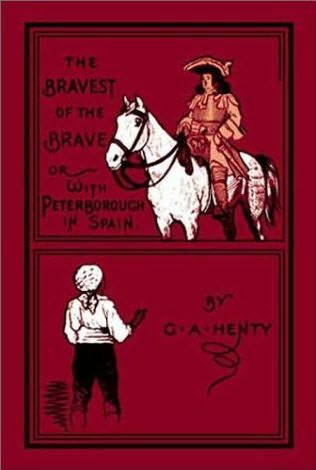 A tale of war in Flanders and Spain
A tale of war in Flanders and Spain By G.A.Henty
In the Irish Brigade A Tale of War in Flanders and Spain - Preface - The evils arising from religious persecution, sectarian hatred, ill-government, and oppression were never more strongly illustrated than by the fact that for a century Ireland, which ha since that time furnished us with a large proportion of our best soldiers, should have been among our bitterest and most formidable foes, and her sons fought in the ranks of our greatest continental enemy. It was not because they were adherents of the house of Stuart that Irishmen left their native country to take service abroad, but because life in Ireland was rendered well-nigh intolerable for Catholics on account of the nature and severity of the laws against them, and the bitterness with which those laws were carried into effect. An Irish Catholic had no prospects of employment or advancement at home. He could hold no civil appointment of any kind he could not serve as an officer, nor even enlist 8s a private, in the army he could not hold land he was subject to imprisonment, and even death, on the most trifling and frivolous accusations brought against him by the satellites of the Irish Government. Not only could he not sit in the parliament of Dublin, but he could not even vote at elections... (~465 pg)Read Online
(10.6 M)PDF (Google.com)
(~465 pg)EPUB
(~465 pg)Kindle
(~465 pg)Daisy
(788.5 K)Full Text
(14.6 M)DjVu
(93.6 K)Metadata
(~465 pg)EPUB
(~465 pg)Kindle
(~465 pg)Daisy
(788.5 K)Full Text
(14.6 M)DjVu
(93.6 K)Metadata
Preface.
The evils arising from religious persecution, sectarian hatred,ill government, and oppression were never more strongly illustrated than by the fact that, for a century, Ireland, which has since that time furnished us with a large proportion of our best soldiers, should have been among our bitterest and most formidable foes, and her sons fought in the ranks of our greatest continental enemy. It was not because they were adherents of the house of Stuart that Irishmen left their native country to take service abroad, but because life in Ireland was rendered well-nigh intolerable for Catholics, on account of the nature and severity of the laws against them, and the bitterness with which those laws were carried into effect. An Irish Catholic had no prospects of employment or advancement at home. He could hold no civil appointment of any kind. He could not serve as an officer, nor even enlist as a private, in the army. He could not hold land. He was subject to imprisonment, and even death, on the most trifling and frivolous accusations brought against him by the satellites of the Irish Government. Not only could he not sit in the parliament of Dublin, but he could not even vote at elections. It was because they believed that the return of the Stuarts would mean relief, from at least some of their disabilities, and liberty to carry out the offices of their religion openly, and to dwell in peace, free from denunciation and persecution, that the Irish remained so long faithful to the Jacobite cause. It was not, indeed, until 1774 that the Catholics in Ireland were admitted to qualify themselves as subjects of the crown, and not until the following year that they were permitted to enlist in the army. Irish regiments had enlisted in France, previous to the Convention of Limerick; but it was the Irish army that defended that town, and, having been defeated, passed over to France, that raised the Irish Brigade to the position of an important factor in the French army, which it held for nearly a hundred years, bearing a prominent part in every siege and battle in Flanders, Germany, Italy, and Spain. A long succession of French marshals and generals have testified to the extraordinary bravery of these troops, and to their good conduct under all circumstances. Not only in France did Irishmen play a prominent part in military matters, but they were conspicuous in every continental army, and their descendants are still to be found bearing honoured names throughout Europe. Happily, those days are past, and for over a hundred years the courage and military capacity of Irishmen have been employed in the service of Great Britain. For records of the doings of some of the regiments of the Irish Brigade, during the years 1706-1710, I am indebted to the painstaking account of the Irish Brigade in the service of France, by J. C. O'Callaghan; while the accounts of the war in Spain are drawn from the official report, given in Boyer's Annals of the Reign of Queen Anne, which contains a mine of information of the military and civil events of the time.
Sincerly G. A. Henty.
